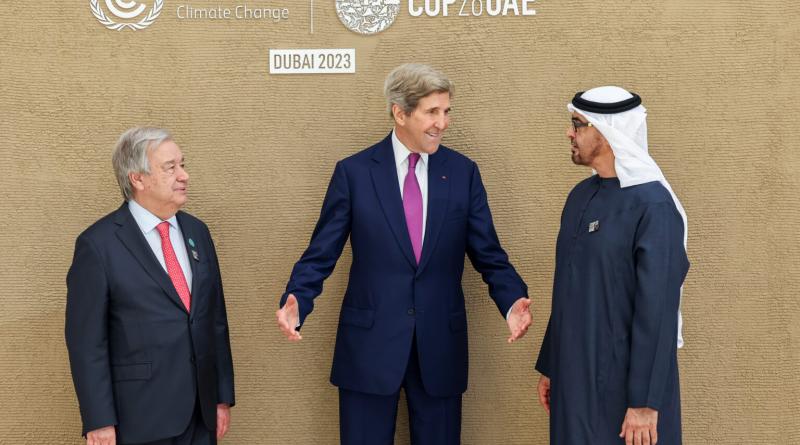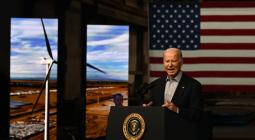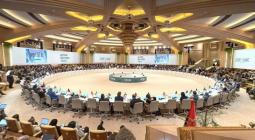At COP28, the Role of Food Systems in the Climate Crisis Will Get More Attention Than Ever

As food and agriculture take center stage, industry groups plan a full-on campaign to downplay the carbon impacts of meat and dairy.
By the end of the United Nations annual climate conference, going on now in Dubai, the term “food system transformation” will be very well worn.
An unprecedented focus on food and agriculture at the conference, known as COP28, comes four months after its Emirati leaders announced a “Food Systems and Agriculture Agenda” for the nearly two-week event, and urged governments to sign onto a first-ever agreement to tackle emissions from their food and agriculture industries.
The conference will host a dizzying 50-plus events on food, agriculture and related issues, and will feature an entire day dedicated to food, on Dec. 10, during which the U.N.’s Food and Agriculture Organization (FAO) is scheduled to launch a “roadmap” for countries to meet their climate targets through “agrifood solutions.”
The food system, from farm to fork, is responsible for about one-third of global greenhouse gas emissions—a conspicuous reality that’s being seized upon as the goal of reducing emissions, centered on fossil fuels, eludes the world’s grasp. Agriculture has finally moved onto the mainstage.
But not everyone agrees what a truly transformed food system actually looks like, and the controversy and division that has plagued this year’s conference from the get-go will likely extend into agriculture and food. While advocacy groups applaud the focus on food, they point out that negotiators at the conference will not attempt to craft any rules or standards for reducing agricultural emissions, focusing instead on climate change adaptation and resilience.
Some would-be attendees are boycotting the event because it’s being helmed by Sultan al-Jaber, an Emirati politician who runs the Abu Dhabi National Oil Company (Adnoc). By the time the food and agriculture events begin in earnest on Friday, the news that al-Jaber tried to use his position at the summit to sell gas will have circled the globe. (He has denied the reports.)
And while food and farming advocates applaud the COP’s intensified focus on agriculture, some have wondered if it might be a convenient and pre-planned diversionary tactic by the oil-rich host country.
In any case, as soon as al-Jaber’s team made clear at FAO headquarters in Rome this July that food systems would be high on the agenda, the agriculture and food industries, and their lobbyists, began gearing up.
The carbon-intensive meat and dairy industries will have a heavy presence and are planning to make the case that their products still have a place in a warming world. The world’s largest grain growers and traders will also be represented.
Agriculture is not just a culprit for climate change, but a victim. And for those on the “victim” side of the equation—the farmers losing crops to climate-fueled drought, flooding or pests; the millions currently facing hunger and starvation—this food-focused COP is urgent.
Industry lobbying groups may have a strong presence at the conference, but advocacy groups are pushing for balance.
“A majority of people globally are small-holder farmers who depend on food production,” said Vartika Singh, a research analyst at the International Food Policy Research Institute. “Most of the people in the Global South are at a disproportionate risk from climate change. They’re the ones who should be at the table.”
Methane and Meat Consumption
Livestock agriculture is the largest source, globally, of methane, an especially potent greenhouse gas. Methane will be high on this year’s agenda, with several high-level announcements expected.
A session to track progress on the Global Methane Pledge—a commitment by high-emitting countries to cut methane emissions 45 percent by 2030—will also be held during the conference. The current pledge emphasizes reducing methane from oil and gas, so advocacy groups will be following along to see whether commitments from the agriculture sector are equally robust.
The meat and dairy industries will have an extensive and targeted presence at the event in an effort to tamp down the scientific consensus that consumers, mostly in rich countries, need to scale back on their products in order to reduce methane emissions.
The head of the U.S. Dairy Export Council, Krysta Harden, embarked on a campaign in the lead-up to COP28 to highlight how the dairy industry can be “part of the environmental solution,” according to her PR agency. “In a landscape clouded by oversimplified narratives, Krysta will debunk misconceptions and share the industry’s genuine commitment to environmental stewardship,” the agency said.
The Guardian reported this week that JBS, the world’s biggest beef butcher, and meat industry trade groups, including the North American Meat Institute, which represents U.S. meat processors, will flood the conference armed with talking points.
The North American Meat Institute announced in a press release this week that it plans to highlight “the role of meat and dairy” in sustainable agriculture.
In its upcoming roadmap, FAO is expected to recommend that people in developed countries with more meat-intensive diets cut their beef consumption. The meat industry thwarted a similar recommendation by the U.N.’s Intergovernmental Panel on Climate Change earlier this year.
Deforestation
At COP26, held two years ago in Glasgow, more than 140 countries pledged to “halt and reverse” deforestation and land degradation by 2030.
Deforestation rates have climbed since then.
Environmental and conservation groups will be pushing for countries to fully implement the declaration, including strong financing commitments. They will also be tracking whether Indigenous groups, which have proven to be the strongest defense against deforestation, are included in the implementation.
Agriculture is the biggest driver of deforestation and forest loss.
At COP26, major food and agriculture corporations, including JBS and grain-trading giant Cargill, agreed to cut emissions and halt “forest loss associated with agricultural commodity production and trade.” But their commitments have largely been unrealized.
At COP27 in Egypt, when Cargill revealed its plan to meet that pledge, Cargill’s customers, including giants such as Walmart and Nestlé, said the company’s deforestation plan was so weak it would prevent them from meeting their own climate and deforestation targets if they continued to buy raw materials from Cargill.
This week, ahead of COP28, Cargill made a major announcement, saying it would eliminate deforestation across Brazil, Argentina and Uruguay from its supply chains.
“Their commitment is encouraging and would be a great step forward,” said Mathew Jacobson, of Stand.Earth, a group that has pushed Cargill to honor its pledges. “But given their long standing behavior of making and breaking promises, it’s hard not to be skeptical.”
Food Waste
An estimated 8 to 10 percent of global greenhouse gas emissions comes from food that never makes it to the table or is thrown away, uneaten.
In the “COP28 Leaders Declaration on Sustainable Agriculture, Resilient Food Systems and Climate Action,” cutting food waste is specifically mentioned for the first time.
“We’re encouraged by the prominent feature of food systems on the agenda,” said Lisa Moon, CEO of the Global FoodBanking Network. “Food systems need to be integrated more into [nationally determined contributions] and national adaptation plans, and within that context, food loss and waste prevention will be key.”





